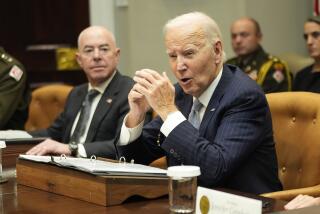Yemeni mother of 2-year-old boy on life support in Oakland granted visa
A mother who was unable to obtain a travel ban waiver to visit her dying son in California has been granted a visa by the State Department, the Council on American-Islamic Relations said Tuesday.
Shaima Swileh, a Yemeni national, has been separated from her family for months as they sought care for their boy, Abdullah. The State Department granted the waiver Tuesday morning after the family’s story spread through social media and appeared in news reports, CAIR said.
The organization said it is “working on getting her stateside as quickly as possible to be with her son.” Swileh is expected to arrive at San Francisco International Airport on Wednesday evening.
Two-year-old Abdullah was born in Yemen and traveled to the United States with his father, Ali Hassan, a few months ago to receive treatment for a degenerative brain disease. Both are American citizens, CAIR said.
“This is the happiest day of my life,” Ali Hassan, 22, said in a statement. “Just last week I was about to pull him off life support …. This will allow us to mourn with dignity.”
The boy spent his birthday in a bed at UCSF Benioff Children’s Hospital Oakland, Hassan said.
When the parents realized Abdullah needed better care than what was available in Yemen, they had to travel to Cairo, where Hassan could petition for Swileh to receive a visa. The request was denied.
In October, they applied for a waiver. Hassan flew on to California with their son while Swileh waited for a decision.
“It’s a huge, huge relief,” said Saad Sweilem, an attorney with CAIR who is representing the family. “This young American family will get a chance to be together one last time.”
Sweilem said he and Hassan found out about the waiver around 5 a.m. The two were together when Hassan received an email about his wife’s case.
“He just pulled up his phone and said, ‘She got it! She got it!’” Sweilem recalled.
Shortly after, Swileh called her husband and confirmed that she had received a visa.
“It was a really sweet moment between them. It was touching,” Sweilem said. “It’s good to know they will have this opportunity to be with their son, and then they can grieve together.”
Hassan feels grateful that his wife will be able to come to the U.S., the attorney said. He has spent his days at the hospital with Abdullah.
“He was the one who brought his son here, thinking he was doing the best for him, and he found himself in this nightmare situation where he ended up feeling like he took his son from his mother,” Sweilem said.
Members of Congress penned a letter to Secretary of State Michael R. Pompeo on Monday, asking that the government expedite its decision on a waiver.
The Trump administration was forced to revise its original travel ban order twice since its rollout in January 2017 to resolve legal problems over due process, implementation and exclusive targeting of Muslim nations.
In June, the Supreme Court upheld the ban. The current version covers five Muslim-majority nations — Iran, Libya, Somalia, Syria and Yemen — as well as North Korea and some government officials from Venezuela.
Visa waiver applications are decided on a case-by-case basis, according to the State Department. There are three criteria outlined in the proclamation for a waiver: that denying entry would cause the applicant hardship; entry would not pose a threat to the national security or public safety of the U.S.; and entry would be in the national interest.
For more California news follow me on Twitter: @sarahparvini
More to Read
Sign up for Essential California
The most important California stories and recommendations in your inbox every morning.
You may occasionally receive promotional content from the Los Angeles Times.











